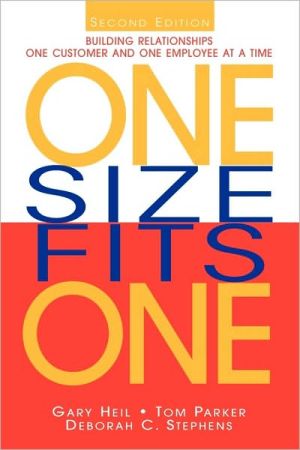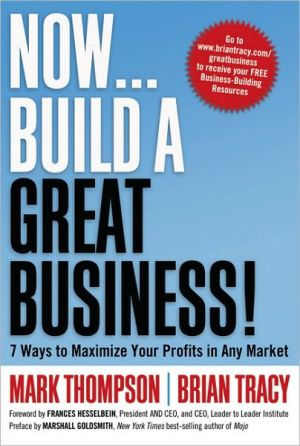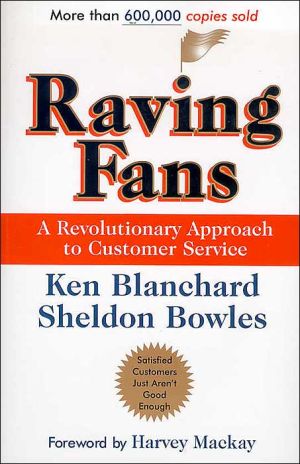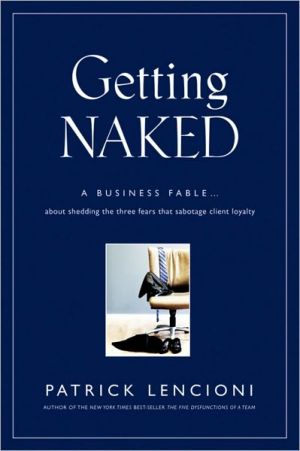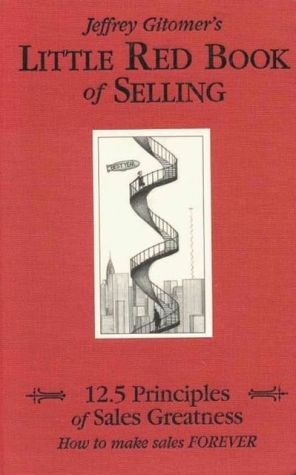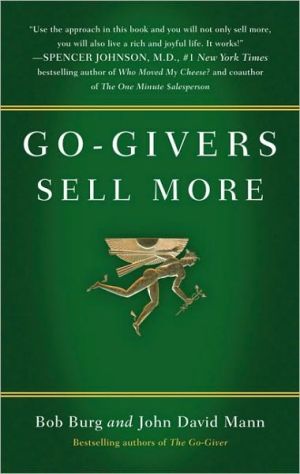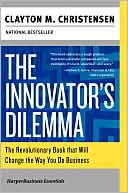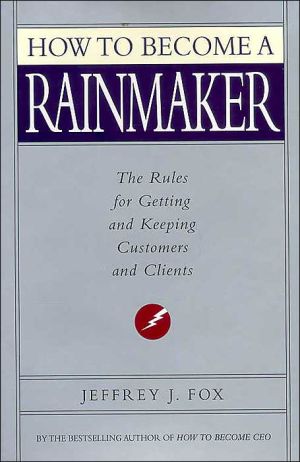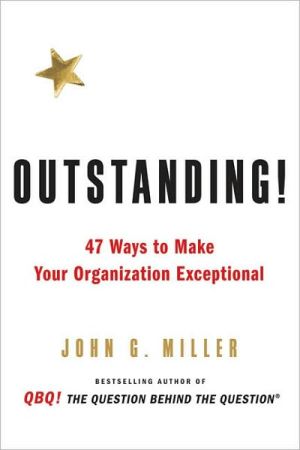One Size Fits One 2e
A billion-dollar paper manufacturer in Wisconsin works closely with a small stationery store halfway across the country to better ensure that the company's products will sell at the retail level.\ * An Internet browser company distributes its products free to the masses, resulting in a market share of paying customers and a worldwide community of prospective buyers of services and products.\ * An irate customer in Berkeley, California, places a $10,000 ad in the Wall Street Journal to protest...
Search in google:
A billion-dollar paper manufacturer in Wisconsin works closely with a small stationery store halfway across the country to better ensure that the company's products will sell at the retail level. * An Internet browser company distributes its products free to the masses, resulting in a market share of paying customers and a worldwide community of prospective buyers of services and products. * An irate customer in Berkeley, California, places a $10,000 ad in the Wall Street Journal to protest what he considers shoddy treatment by a large coffee company-and ultimately receives 6,000 responses from other dissatisfied customers to his toll-free telephone number. Love it, hate it, fear it, or wish it would just disappear, we are entering an era where one size no longer fits all-or even a few. We find ourselves in a highly personalized, customer-driven environment where now "one size fits one." The only business objective that makes any sense is a long-term relationship with each profitable customer. Today's customers have vast power to collaborate with you to build your businesses, but if they're not happy, they will walk away faster than ever before-or actively undermine you. How can you win the unshakable loyalty and trust of these savvy customers? One Size Fits One: Building Relationships One Customer and One Employee at a Time received critical acclaim from the business press and the endorsement of top CEOs by laying out the ten rules for what customers want-in their own blunt words-and showing how your company can begin to develop the personalized relationships necessary to build loyalty. This updated Second Edition places a much strongeremphasis on distributed leadership throughout an organization, which is needed to build enduring customer relationships. It presents the organizational structure you need to support such a distributed leadership, thereby creating greater customer/employee relationships and a better, stronger company. Certainly no company can deliver "one size fits one" value without loyal employees committed to creating exceptional value for each individual customer. One Size Fits One explains why yesterday's workplace mentality no longer works and shows how relationships inside organizations must change to successfully unleash the power of truly committed employees, using entertaining examples and anecdotes from real life. In a world where "one size fits one," no one will have to settle for the ordinary, and any business that provides it will be unable to survive. One Size Fits One is a source of inspiration for all managers, providing a template for beginning the odyssey-one customer and one employee at a time. Praise for the First Edition "It's a book that should be read every year. With customers today having more choices than ever before, how you serve them could be the difference between keeping or losing those valuable customers and your business. One Size Fits One will help guide you."-Chandler Barton, Chairman, Coldwell Banker Corporation. "A powerful, must-read map for discovering a valuable and elusive treasure: customer loyalty. One Size Fits One will transform you into a demanding consumer and passionate service provider to customers, associates, and employees."-Chip R. Bell, author, Customers as Partners and Managing Knock Your Socks Off Service. "One Size Fits One will show your organization how to treat every customer like they're your only customer."-Roger Dow, Vice President and General Sales Manager, Marriott Hotels and Resorts Worldwide, and coauthor, Turned On. "If you are in the service business you have to read this book! Gary is one of the few people in this field who truly understands that the environment you create for your employees largely dictates the quality of service your customers will receive."-Kim Jeffery, President and CEO, Perrier Group of America Inc.
Note: The Figures and/or Tables mentioned in this sample chapter do not appear on the web.\ PART ONE\ Building Loyal Relationships One Customer at a Time\ There is only one boss: the customer. And he can fire everybody in the company from the chairman on down, simply by spending his money somewhere else.\ --Sam Walton\ NOTE: Because the customer willdramatically influence the way we do business in the future, Part One has been written from the customer's point of view. We have chosen the voice of the end-user customer, whose dollars drive the entire process, and whose pull is felt from internal department to internal department, strategic partner to strategic partner, and person to person, all the way up the distribution chain and down again. No one, therefore, can afford not to understand who this end-user customer is and what his or her wants are. For it is only from this understanding that a successful collaboration among strategic partners to create value can emerge. And it is only through this understanding that a successful long-term relationship between the final service provider and the ultimate customer can develop. That's why, when you read through Part One, you'll see a pre-ponderance of examples about the consumers of products and services rather than examples of how partners within the process might cooperate to make the delivery of value possible.\ REMEMBER US?\ Curious things are happening. More and more companies, it seems, are trying to turn us into loyal customers. We read about it in the newspapers and magazines-- in Time and Newsweek as well as Inc. and Fortune. We hear about it on the radio and on TV. Companies in every industry are saying they want us around for the long term. They say their future success actually depends on keeping us in the fold. Executives proclaim that the only profitable customer is a loyal one and that the only way to grow a good business is by building good relationships.\ Just about everywhere we look, in fact, there's evidence of our newly discovered importance to companies we have been doing business with for years. We go to our bank, our car wash, or the grocery store, and everyone is wearing "The Customer Is #1" buttons. There's a "Customer Credo" next to the register at our local minimart. Our insurance agent has a "Year of the Customer" banner in his off ice that's been there for at least three years. And all of us who work anywhere have T-shirts, sweat-shirts, caps, umbrellas, pens, or beach towels with "customer- this" or "customer-that" printed on them.\ And, if all this attention to customers weren't curious enough, we're actually beginning to believe that some of the companies we deal with are genuinely serious about keeping us as loyal, happy campers.\ But do businesses really understand what it will take to win our loyalty? To come back to them again and again? To buy everything we buy from them? To share information about ourselves with them? To pay a premium for excellent service and then tell stories about it? To try their new products? To send our friends? In short, to trust them?\ IT DEPENDS\ The truth is, it depends. It's different for every customer. It varies according to our individual needs and expectations, what we like and what we don't. There's no generalizing about what makes an individual or a business loyal.\ Still, there are a few things we do know about what makes us loyal-- if not from our business relationships, then from our personal ones. We hate being taken for granted. We don't want to be treated as if we have no other options because we do. We can take our business elsewhere or drop it altogether.\ We like it when businesses listen to us. We want to be respected. We want to feel that we're important to the people we're dealing with and that they genuinely care about us. We want to feel special-- which is to say that, in a competitive environment, the company that merely satisfies isn't doing the job; satisfied customers are not necessarily loyal customers.\ The way we see it-- and this goes right to the heart of the issue-- it's unlikely in this day and age that any company, no matter how low its prices, will win our business over the long term with everyday, or ho-hum, one-size-f its-all products or services.\ Quite the contrary. As the future unfolds, it's becoming increasingly clear that, as customers, before we give our individual loyalty to any company, we're going to demand what we've wanted for years but until recently had almost given up on: to be respected as individuals. That's right, as in one-size-fits-one. Every one of us treated as if we personally counted, in a one-size-fits-one relationship.\ How might that kind of treatment play itself out? Simple. Say we call a hotel to reserve a nonsmoking room. "Sure," they say in Reservations, eager for our business. When we show up, however, suitcase in hand, a front-desk clerk explains that he's sorry but there aren't any nonsmoking rooms available. Compare that with being told, at the time we make the reservation, that there are no nonsmoking rooms available, but that the hotel will call and let us know if one opens up. In the end, we still might not get a nonsmoking room, but we'll at least feel that we've been treated as an individual, not just a "booking," and dealt with in a forthright and honest manner. The trouble is, over the years it's rare that we've been treated this way, which is why when it comes to giving our loyalty, we're just a little gun-shy.\ CHOICES, CHOICES, CHOICES\ Another reason we tend to be reluctant to promise ourselves to any one company these days is the enormous number of choices that are suddenly open to us. Everywhere we look, it seems, we're inundated with new choices, more choices, and better choices. Huge retailers like Wal-Mart, Price Costco, and Target are pleading their cases for more of our money. Not satisfied with all they've already been selling us, they also want to be our grocer, our pharmacist, our optometrist, our stationer, and our auto repair shop. Circuit City, where only yesterday we bought our tape recorders, electronic gear, TVs, and washing machines, has now gone into the used-car business big-time with CarMax.\ Years ago, our choices were limited, and demand far outstripped supply. But the growth of the consumer-oriented economy has resulted in a deluge of goods and services. Looking for athletic shoes? Name your sport and then pick from at least 20 brands. Ice beer? In 1993, we had a single domestic brand to choose from; in 1994, there were 36. We open our Yellow Pages and find as many pizza parlors as lawyers. Crack open the business pages and we find as many mutual funds as individual stocks. Bottled water? Restaurants? Microbreweries?\ The list goes on and on. In 1981, there were 2,689 new products introduced on grocery and drugstore shelves; by 1991, that number had skyrocketed to 16,143. Today, the number has tripled.\ With so many companies out to win more of our dollars by offering us more choices, it's actually gotten to the point where it's hard to tell what business some of these companies are in. Is the Hard Rock Cafe in the food business, the entertainment business, the memorabilia business, or the T-shirt business? When we visit the great Mall of America in Bloomington, Minnesota, are we going to a shopping center, an amusement park, or a destination resort? How about when we call Lands' End? Are we ordering from a clothier, a luggage boutique, or a dry goods emporium? Everyone, it seems, is trying to sell us everything under the sun.\ Meanwhile, more than ever before, companies and products from all over the world are vying for our business-- cars from Korea, software from Canada, and soft drinks from Spain-- bringing us even more choices than we ever dreamed possible. A trip through the specialty department of our local supermarket reveals products from so many countries that reading their labels is like reading the membership roster of the United Nations.\ INFORMATION, PLEASE\ A final reason for our recent reluctance to give our loyalty is the type and amount of information that we have at our disposal. Thanks to radio, TV, print media, and the Internet, we can compare and contrast goods and services as never before. We're also growing bolder about voicing our discontents, and we're finding that companies do listen. For example, we've learned that a growing number of "vigilante customers" in our midst are taking on the corporate powers that be-- and winning-- just as futurist Faith Popcorn predicted we would, and that all around the country these vigilante brethren of ours are alive and well and actively recruiting. Thirty years ago, Ralph Nader and his band of young, idealistic followers, "Nader's Raiders," were just about the only consumer advocates in sight. Today's activist customer is as likely to be the formerly mild-mannered, suburban businessperson, our neighbor, or even one of us-- checking out a rogue Web site like untied. com to add our voice to those customers dissatisfied with United Airlines, or nynexsucks.com to give this Baby Bell a piece of our mind.\ The question we more moderate customers have is: Aside from our Web protests and short of setting our car on fire in front of our local dealership to protest shoddy service or taking our letter carrier hostage because we're frustrated with the U. S. Postal Service, what can we do to get more and better results from those with whom we do business? Simple. Many of us are doing it already. We're hitting companies where we know it hurts them the most-- in the pocketbook. And we're doing it by voting, f irst with our wallets and then with our feet.\ We've forced a major sof t drink company to reinstate its old formula. A national consumer goods retailer, dis-satisfied with one of its key supplier's billing and invoicing procedures, threatened to pull all its business if the supplier didn't change its ways. Consumer pressure led the U. S. Food and Drug Administration to revamp nutritional labeling. And widespread disgust with sloppy environmental practices af ter the Exxon Valdez spill was a factor in the decision by major oil companies to use only double-hulled tankers.\ MEET THE NEW CUSTOMER\ As a result of companies' scrambling for our loyalty, coupled with our long-running frustration with their ways of doing business and our ability and willingness to take our business elsewhere, we're gradually getting a greater and greater voice in how companies treat us. It's only a start, but companies are starting to listen to our concerns about what we get from them and how we get it. Instead of ignoring us as they used to, or reciting their traditional one-size-fits-all policies chapter and verse, companies are starting to customize their rules and to alter their ways of doing business to win us over and keep us coming back.\ The power to call the shots in the marketplace is beginning slowly but inexorably to shif t from the organizations and individuals we do business with to us. And it doesn't seem to matter whether we're buying a washing machine for our home, a pizza for our kids, or a computer work station for the off ice. Nowadays, we're expecting service and services that didn't exist even a year ago and asking for things we've never dared ask for before. And more often then not, we're getting them-- or soon will be.\ Five years back, for example, a car owner facing a major repair was simply out of luck if the warranty period had expired. The owner wouldn't even think of calling the manufacturer. Today, chances are that a complaint lodged with the dealer who sold the car will result in a free repair with a minimum of hassle-- especially if the car owner is a good customer who's been bringing the car in for service since it was new. And, f ive years ago, a company unhappy with its $30,000 photocopier was stuck with it. Today, if that same company were to buy a machine from Xerox, the faulty unit would be whisked away and the money refunded. The only question Xerox might ask is, "What can we do to make it right?"\ Of course, knowing what it takes to impress a customer was hardly pioneered by Xerox. There have always been businesses that have been ready, willing, and able to earn customers' loyalty.\ But most of these businesses have been small and local: our dry cleaner, for example, who'll do whatever it takes to make sure a suit is ready in time for a business trip-- including hand-delivering it after business hours to our door. The restaurant down the street whose host not only remembers our name but always manages to find us a table, even on the busiest evenings. The corner stationery store that understands if we forget our wallet and trusts us to pay tomorrow.\ But, a number of larger companies-- such as Xerox, USAA Insurance Company, American Express, MBNA Bank, and many others-- are now starting to turn things around by taking the first steps necessary to win our long-term commitment. Despite their size, these companies are finding ways to "act small" and give us as much special attention as . . . well, our local dry cleaner.\ A MOVEMENT TAKING HOLD\ The fact is that a growing number of businesses, large and small, are beginning to catch on to what we're looking for as customers. Service is def initely on the upswing. Products are far more reliable. Guarantees are longer. Warranties are more comprehensive. Companies in most every industry seem to be making at least a half hearted, if not a genuine effort at providing us with better value and a more satisfying buying experience.\ For example, it used to be that the standard 10 A. M. to 3 P. M. banking hours were, putting it mildly, very inconvenient. Today, with telephone and online banking and easy-to-use ATMs, we can get cash, speak to a banker, check our balances, and perform many other complex transactions at any hour of the day or night.\ The slogan of Federal Express is: " The most important package we ship is yours." It's possible to track the progress of your shipment by telephone, or through a PC with free sof tware provided by Federal Express, as is the case with many of the overnight delivery companies.\ We call Lands' End to send a gift to a friend, and the service representative taking the order reminds us that we sent the same gift to that person two years before. We pick up the phone in Duluth to order a pizza from a Pizza Hut, and the person on the other end of the line asks if we'd like the same ham-pineapple-sausage-mushroom- hold-the-jalapeños combo we'd ordered a week before in San Diego.\ If we're in the market for a pager, Motorola gives us more options to choose from than we had when we bought our last car and, unlike our auto purchase, there isn't a complete "performance package" we have to order to get the single option or options we want.\ We walk into our local clothing store, and our salesperson has a special chapter with our name on it in his "customer book." In the old days, we'd have been pleased if he recognized us when we walked through the door. Today-- for better or worse-- he's able to recount the size, color, style, and price of everything we've ever bought from him or anyone else in the store.\ And it doesn't stop there. Today, Marriott hotels offer the 11-second check-in-- we give our name to the bellman at the door and he hands us our key. Peapod Interactive Services lets us order groceries and arrange for delivery, all on our computer. With Waiters-on-Wheels, we can get the specialty of the house from some of the best restaurants in town-- along with virtually everything else on the menu-- served to us at our house. We send for a Country Store catalog and we can order custom-sized quilts and bedding. The custom-made bikini and custom- made Levis are already here, and custom-made Nike running shoes are on the way.\ Meanwhile, other companies are doing their best to win our loyalty with coupons, discounts, free nights, and other assorted add-ons and goodies. Still others are inviting us to join their frequent-flier, frequent-guest, frequent-shopper, frequent-skier, and frequent-just- about-everything-else clubs. Even those notoriously poor service companies we used to kid about-- the ones we thought would never get it-- are showing signs of life.\ With few exceptions, there's hardly a company out there that hasn't shown some improvement in dealing with its customers over the past few years. Even the most stubborn, wrong-headed companies have inched in our direction. Either that, or they've gone out of business.\ WHAT'S THE NEXT STEP?\ So, if this is the case-- with the U. S. Postal Service finally accepting our Visa and MasterCards-- why is it that most of the companies we deal with still seem to underestimate what it takes to win our loyalty? This is despite the fact that, from their perspective, they seem to be providing us with the one-size-fits-one products and services we've been asking for.\ The question is, are they? Are they really? Or are most businesses today hooked on thinking of one size fits one primarily in terms of using "gee-whiz" technology to customize a life insurance policy or monogram a sweater? Instead of building the complicated relationships that lie at the heart of winning our loyalty, are they opting for the quick fix?\ Do these businesses truly believe that the depth of the relationships they form with us, and not merely the number of them, will be the key to their future success or failure? Are these businesses even aware of how extensively they will have to change to make these relationships work? Probably not. Not from what we've seen. Not really.\ For example, do they know that a loyal business relationship with us or our company is much like a relationship with any other human being-- and just as complex? That it's more than valet parking, remembering our names, or flashing us a big smile every time we look their way? Just imagine if that were our modus operandi in the relationships we have with our friends-- parking their cars, calling them by name, and giving them our pearly whites-- that and "business as usual." How long would it be before they were out the door? We expect genuine commitment, sharing of information, emotional bonds, and the like from our relationships with family and friends. Why should we settle for less than that in our business relationships?\ More to the point, do businesses understand that the loyal relationships they are seeking are fundamentally different from the relationships they've traditionally had with us? And, that to win our loyalty, it's going to take a whole lot more than they've already given?\ With the power in business relationships flowing in our direction, our loyalty can no longer be bought for a lower price, a dollars-off coupon, club "membership," or free miles-- although we'll happily pay less, cash the coupon, avail ourselves of the advantages of the club, and convert those miles into a trip.\ Rather, what we're looking for today in a business relationship is far more diff icult to manufacture or come up with than customized products, services, and marketing ploys. We're looking for companies and people who genuinely care as much about us as individuals as they do about their bottom line and whose actions bear this out. It's the one-size-fits-one relationship we're looking for, first and foremost, and not the one-size-fits-one goodies that go along with it... at least not just the goodies. And until everyone-- from the receptionist to the CEO-- in the companies we do business with realizes this and acts on it, our loyalty will be hard to come by.\ The good news for those companies seeking our loyalty is that we're genuinely on the lookout for companies, stores, business partners, and individual service providers to whom we can be loyal. We like the familiarity, the good feeling, the camaraderie that comes from going back again and again to the same mechanic, the same salesperson, the same barber, or the same business vendor. Besides, it's convenient-- not having to shop around always saves us time and hassle and almost always saves us money.\ The bad news is that we're wary-- both as individual customers and as business customers. Our response to many a company's sudden and intense interest in us is akin to a fear voiced by comedian Woody Allen: that the petroleum companies will discover that human beings contain oil. As a consequence, before we commit to anyone, we want to be certain that his or her interest in an individual relationship with us is genuine. We want to know that a business really cares about us and is not simply trying to fool us into thinking it does. We want to know that we're truly number 1 in its eyes, not a distant number 2 to its profits and processes.\ Adding to the bad news and standing squarely in the way of our giving loyalty is our past history with most companies-- the frustrations we've felt, and frequently continue to feel, about the way they do business. Though a few companies genuinely seem to be "getting it" when it comes to creating customer-focused environments that encourage the types of relationships that will make us loyal, far too many merely claim to be getting it. They continue to make us go through all sorts of contortions to get what we want-- even if it's just the most basic satisfaction.\ It's as if these companies are in love with the idea of having loyal customers; they just haven't the faintest idea how to actually get them. Either that or all their talk about loyalty is just lip service; the words-- and the pasted-on smiles-- are there, but the spirit is missing. It's actually gotten to the point where we don't know what's more frustrating: those companies that just plain don't care about us and make no secret of it or those that are faking it by pretending to care but are going about their business as usual.\ The truth is that, if these companies actually thought about the process, they'd probably find that they don't have to engage in massive reworking of their products and services. It's not necessary to burn down the store; what is necessary is a new approach, not just new merchandise. In fact, if you're frantically trying to find out what's wrong with the goods, then you haven't gotten the essence of the message. Customers probably aren't as mad at the merchandise as they are at you.\ THINGS ARE LOOKING UP\ Still, there is definitely reason for hope. Hope for us all, as customers. The marketplace is changing and every indication is that we will be the major beneficiaries of those changes. In some cases, we already are. Many of us have recently been astounded and pleased by the service and selection at a newly opened superstore, bought a custom-made pair of Levis for only a few dollars more than an off-the-rack pair, and made a killing in mustard at our warehouse club. It's not uncommon to hear a friend say he was treated like a king when he took his car to the dealership for an oil change. A neighbor might express her surprise and delight at how quickly a long-distance provider adjusted an error in her bill. As the battle for our loyalty shif ts into higher gear, things truly seem to be going our way.\ How, then, will having it our way affect those with whom we do business? How much will they have to change to form the relationship with us that they say they're looking for? What precisely will they have to do? And what does our way even mean? As we said earlier, our way means something different for every customer.\ Nevertheless, there are common elements in what individuals look for in a loyal relationship: being listened to, being respected, being cared about, feeling special. Translating these constants into a business context, we've come up with 10 things we'll be on the lookout for when we make our decision about who we'll be loyal to in tomorrow's world. We may not always have a clear view of it today, but it's a world where loyalty and commitment will be won one customer at a time and where one size no longer fits all or even a few but where one size fits one ... and one alone.
AcknowledgmentsForewordWelcome to a World Where One Size Fits One1Pt. 1Building Loyal Relationships One Customer at a Time29What Customers Want: Ten Rules for Building Loyal Relationships521Take Us Personally, Make It Personal532The Average Customer Does Not Exist - Get to Know Us763The Details Are Important to Us ... They Should Be to You984Make Everyone a Relationship Builder1025Make Our Experience Special: Give Us Something to Talk About1236Our Time Is as Important as Your Time1407If Something Goes Wrong, Fix It Quickly1498Guarantee Our Satisfaction1669Don't Take Us for Granted18010We Care Whether You're a Responsible Corporate Citizen188Pt. 2Building Relationships One Employee at a Time197Getting on with the Job208Ten Rules for Building an Intrinsically Motivating Environment2391Reshape the System to Encourage Everyone's Best Efforts2402Create a Cause Worthy of Commitment2553Build Core Values That Guide Performance2624Commit to the Truth and the Sharing of a Sense of Reality2675Ensure That Every Person Has a Meaningful Role2706Increase Accountability, but Not More of the Same2767Build Cooperation Instead of Internal Competition2848Abolish the Corporate Caste System2939Develop an Optimistic, Caring, and Supportive Environment29810Build Trust One Employee at a Time306Epilogue313Index315The Center For Innovative Leadership322
